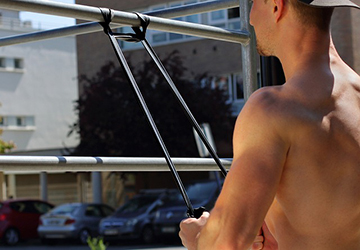Are you stressed, anxious, or overwhelmed? Time to hit the gym! Exercise isn't just good for your physical health; it can also do wonders for your mental health.
In today's fast-paced world, taking care of your mental health is more important than ever. So why not give your brain a much-needed boost by trying fitness exercises?
In this blog post, we'll explore the top 10 exercises to help improve your mental health. Suitable for all fitness levels, these workouts are designed to promote relaxation, increase focus and improve mood. Plus, they can be easily incorporated into your existing fitness routine.
So without further ado, let's take a deep dive into the fitness routines that can positively impact your mental health!

1. Yoga
Yoga is an ancient practice that combines postures, breathing techniques, and meditation. It has been shown to reduce stress, anxiety, and depression while improving overall mental health.
Practicing yoga can help you become more mindful, focused, and confident, ultimately leading to better decision-making and emotional stability.
Some famous yoga poses for mental health are Child's Pose, Cat-Cow Pose, and Legs to the Wall. If yoga is new, consider taking a class at your local gym or an online tutorial.
2. Aerobic exercise
Aerobic exercise such as swimming, running, or cycling is excellent for mental health. They increase blood flow to the brain, which can help improve cognitive function and reduce symptoms of anxiety and depression.
Plus, aerobic exercise releases endorphins, the body's natural "feel-good" chemicals that can help boost your mood.
Get at least 30 minutes of moderate-intensity aerobic activity most days of the week for maximum mental health benefits. You can also try high-intensity interval training (HIIT) for a more challenging workout.
3. Strength training
Resistance training, also known as strength training, is an exercise that uses weights or resistance bands to activate and challenge muscles. This exercise has been shown to help reduce symptoms of anxiety and depression, improve self-esteem, and enhance cognitive function.
Examples of resistance training include squats, lunges, and push-ups. You can also use gym equipment such as dumbbells, barbells, and resistance machines for a more focused workout. Schedule workouts at least twice a week to get the best results from strength training and target all major muscle groups.
4. Tai Chi
Tai Chi is a gentle, fluid movement that originated in China. It involves slow, intentional action and deep breathing, which can help reduce stress and anxiety while improving mental clarity and focus.
Tai chi can be especially beneficial for older adults because it can also help improve balance and prevent falls.
Many gyms offer tai chi classes, or you can find instructional videos online. Learning proper form and technique is essential to getting the most out of this exercise. So if you are new to tai chi, consider working with a qualified teacher.

5. Pilates
Pilates is a low-impact exercise that focuses on strengthening the core muscles, improving flexibility, and promoting proper posture.
Like yoga, Pilates involves deep breathing and mindfulness, which can help reduce stress and improve mental health.
Pilates exercises can be performed on a mat or with specialized equipment such as a Reformer or Cadillac. Many gyms offer Pilates classes, or you can find online tutorials to practice at home.
If you're new to Pilates, consider working with a certified instructor to learn proper form and technique.
6. Boxing
Boxing is a high-intensity workout that combines strength, speed, and endurance. It's an excellent stress reliever that allows you to focus on physical activity. Boxing can also help improve focus, coordination, and mental resilience.
Many gyms offer boxing classes or have heavy bags and other equipment. You can also practice boxing at home using a punching bag or tai chi. Wear protective gear, such as bandages and gloves, to avoid injury.
7. Dance
Dancing is a fun and engaging exercise that can help improve your mood and reduce stress. It involves rhythm, movement, and creativity and can help stimulate the brain and promote mental health.
There are many types of dance, such as ballet, hip-hop, and salsa. Consider taking dance classes at your local gym or community center, or turn on some music and dance near your living room. The key is finding a dance style you enjoy and will stick to.
8. Group Fitness Classes
Group fitness classes like Zumba, HIIT, or circuit training provide a social and supportive environment that can help improve mental health. Exercising with others can help boost motivation and self-esteem and foster camaraderie.
Most gyms offer a variety of group fitness classes for all fitness levels. Find a style that interests you and fits your schedule, and don't be afraid to try new things.
9. Stretch
Often overlooked, stretching is an integral part of any workout routine, and it can help improve flexibility, prevent injury, and promote relaxation. Stretching can also help relieve muscle tension and stress, leading to a clearer, more focused mind.
Incorporate stretching into your routine, or try a particular flexibility class, such as yoga or Pilates. Focus on each major muscle group and hold each stretch for at least 30 seconds.
10. Mindful walking
Mindful walking is a simple but effective exercise that combines physical activity and mindfulness. It's about walking comfortably while focusing on your breath, the feel of your feet touching the ground, and your surroundings.
You can practice mindful walking outdoors or on a treadmill at the gym. Aim for at least 30 minutes of mindful walking daily to reduce stress, improve mood, and improve overall mental health.
Diploma
Taking care of your mental health is as important as maintaining your physical health. Incorporating these ten best workouts into your fitness routine can benefit your body and mind. Whether you're trying to reduce stress, improve focus, or improve your mood, these exercises have something for everyone.
Before starting any new exercise program, consult a health professional, especially if you have any pre-existing conditions or concerns. Most importantly, find activities that you enjoy and can stick with in the long run, as persistence is critical to reaping the mental health benefits of exercise. Now is the time to lace up your sneakers and embark on a journey to improve your mental health!




